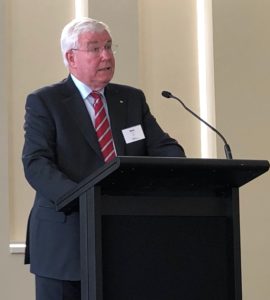Earlier this week, Mark Paterson AO (pictured), Chief Commissioner of ASQA (Australian Skills Quality Authority), gave an update on ASQA’s priorities, at an ACPET event in Sydney. CCA’s CEO, Dr Don Perlgut, was there and filed this report:
ASQA has a number of priority regulatory activities over the next two years, including:
- a strategic review of the international sector, likely to result in a significant report like the one on unduly short training – this one will focus on international VET and English language education services delivered by ASQA-regulated providers; and
- trainer and assessor competencies.
Domestically, ASQA will focus on the following training, as it sees each of them as presenting certain quality risks:
- Certificate III Early Childhood Education
- Diploma Early Childhood Education
- Certificate IV Training and Education (TAE)
- Certificate III Individual Support
Mark Paterson observed that in the last financial year, more than 500 of the 4000 RTOs regulated by ASQA reported no training activities in the preceding financial year. ASQA asks the question: “Why would they want to be RTOs, if they conducted no training, with all of the administrative costs associated with registration?” Until recently, ASQA was receiving about 500 applications each year for registration. ASQA rejected around one in three applications for initial registration as a new training provider. Many such applications are submitted by organisations without the educational capacity or the financial resources to deliver quality training. The rejection rate in 2013/14 was as low as 12%, but has increased to 39% so far in 2018/19.
Mark Paterson emphasised that ASQA focuses on risk, and that the role of third parties are an ongoing concern, saying that “consultants don’t replace the RTO”. He also said that decisions on deregistration were taken only for “profound failure of performance”.
At the same event, Nick Saunders AO (pictured below), Chief Commissioner of TEQSA (Tertiary Education Quality and Standards Agency) – which looks after higher education provider registration – reported that while only 40% of TEQSA organisations were for-profit, they represented 70% of the high risk organisations. This occurred because of poor student outcomes and less investment in staff, including little leadership, poor student-staff ratios and casualisation of the workforce.






